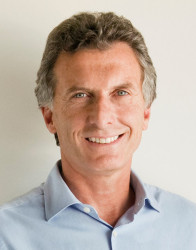BUENOS AIRES (Reuters) – President-elect Mauricio Macri vowed yesterday to get Argen-tina’s stalled economy moving again but refrained from laying out specific measures until he gets to know the “real” state of the nation’s accounts.
The day after winning the presidential run-off vote, the centre-right leader was more incisive on other matters: He called on the Central Bank’s top tier to step aside and said he wanted Venezuela suspended from the Mercosur trading bloc for human rights abuses.
The pro-business Macri campaigned on promises of sweeping economic reforms to tackle weak growth, high inflation and a yawning fiscal deficit after more than a decade of free-spending leftist populism.
But the challenges are enormous. At home, he lacks a majority in Congress and currency reserves are running perilously low. Abroad, the slowdown in China, weak commodity prices and a deepening recession in main trade partner Brazil all pose risks.

“Argentina’s big problem today is that for four years there has been no growth, for four years no jobs have been created and now we have to get the country moving,” Macri said.
He pledged to correct the errors of the outgoing leftist Peronist government. He called capital controls a mistake and said his government would restore the Central Bank’s independence and overhaul national statistics.
Asked about his strategy for lifting currency controls, Macri urged patience saying he first needed to discover “what are the real economic numbers.” He takes power on December 10 but said he needed more time before naming his cabinet.
Macri won 51.40 per cent of votes while his ruling party rival Daniel Scioli drew 48.60 per cent. The narrower-than-expected margin underlines the risks voters felt Macri’s reform push will entail.
In ending more than a decade of Peronist party rule, Macri becomes only the third non-Peronist leader since the end of military rule in 1983. The other two failed to finish their terms, a reminder of the difficulties that Peronist labour unions, state governors and opponents in Congress could cause Macri if he is unable to get the economy growing quickly.
Macri’s “Let’s Change” coalition only has 91 of the 257 seats in the lower house of Congress, yet he will need congressional approval to push through some reforms – including an eventual deal with US creditors over unpaid debt.
His success will lie in his ability to secure ad hoc alliances with lawmakers loyal to another defeated presidential candidate, Sergio Massa.
Massa, a dissident Peronist who split with outgoing President Cristina Fernandez two years ago, welcomed Macri’s win and signalled his willingness to back policies on which they were aligned.
“We’ll support those measures that are good and we’ll signal those we think are bad,” Massa said on Twitter on Sunday night.
Fernandez’s Front for Victory party also lacks a majority and would need to seek alliances itself to block Macri in the lower chamber.
Argentine bonds inched up yesterday on expectations of a more investor-friendly government, with a Macri win largely priced into the market before the run-off vote, while stocks broadly fell on profit-taking.
Foreign investors are waiting for details on how and when Macri will tackle debt default negotiations with US creditors, remove capital controls, devalue the peso currency and replenish hard currency reserves.
Even so, they cheered Macri’s victory.
“Macri understands what the country needs to do to regain the confidence of international investors and get the economy back on its feet,” said Andrew Stanners, investment manager at Aberdeen Asset Management.
Macri will be able to eliminate export taxes and quotas on corn and wheat shipments without having to ask Congress first. Lifting capital controls lies with the Central Bank.
Macri promises to restore the Central Bank’s independence and yesterday made clear he expected President Alejandro Vanoli, who is a trusted ally of Fernandez, to resign.
“We hope they have the dignity and generosity to allow the new government to choose its path by letting us choose people in which I and all my team hold trust,” Macri told reporters in what he promises will be the first in a series of press conferences.
Vanoli’s term runs until 2019. Last week he opened the door to quitting early if Macri presses ahead with plans to unwind capital controls. Macri would need congressional approval to remove him from office, though he can sack him by presidential decree if a congressional chamber cites wrongdoing.





